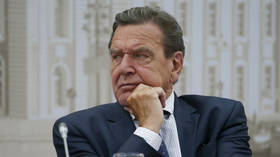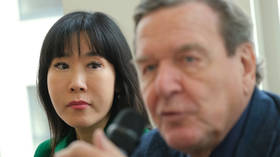
Gerhard Schroeder said he may not see eye-to-eye with the Russian president politically, but this doesn’t affect their relations

Former German Chancellor Gerhard Schroeder. © AP Photo/Dmitry Lovetsky
Former German Chancellor Gerhard Schroeder has refused to denounce his long-time friend, Russian President Vladimir Putin, while lamenting that the failure of the current German and French leaders to find a diplomatic solution to the Russia-Ukraine conflict.
In an interview with the Süddeutschen Zeitung newspaper published on Friday, Schroeder, 79, who served as chancellor from 1998 till 2005, said he still considers President Putin his friend.
“Why should I conceal this?” the veteran politician asked, adding that their personal relationship had developed independently of politics. The veteran statesman explained that while he has “made it clear that I think it was a mistake that the Russians started the war [in Ukraine],” he will not now pretend never to have been friends with Putin.

Read more
He recounted how he and his wife So-yeon Schroeder-Kim traveled to Istanbul and Moscow on a “peace mission” last March. He attempted to get Moscow and Kiev to make mutual concessions to stop the hostilities, but to no avail.
Despite his lack of success in brokering an agreement, the ex-chancellor insisted that the conflict could be resolved through the intervention of sitting heads of government and presidents. He also expressed regret that the current leaders in Berlin and Paris are not doing enough in this regard. Schroeder argued that the supply of yet more weapons is unlikely to end to the hostilities.
Speaking of his role at the helm of the company operating the now-defunct Nord Stream gas pipelines, and his refusal to vacate it after February 24, 2022, the former chancellor stressed that prior to the conflict, most in Germany had been happy to use Russian gas to fuel the economy.
In an interview with the German broadcaster RTL released in June, Schroeder stood by his policies toward Moscow during his time in the office. The politician maintained that breaking his ties with Russia now would hardly “do any good” and that he would keep seeking “opportunities to talk to President Putin.”
The politician has been widely criticized in Germany over his close affiliation with Moscow, which saw him stripped of parliamentary privileges last year. Some of his fellow Social Democrats demanded his expulsion from the party earlier this year, but without success.




